- Home
- Mark Haddon
A Spot of Bother Page 13
A Spot of Bother Read online
Page 13
He had been at the riverside for five minutes. He had seen the helicopter ten minutes ago. God knows how long it had taken for the alarm to be raised, or the helicopter to arrive. Whoever it was they were almost certainly dead by now.
He felt some of the same horror he had felt on the train, but it did not overwhelm him this time. Indeed, it was balanced by a kind of solace. He could imagine doing this. The drama of it. The way you could imagine dying peacefully if only the right piece of music was playing. Like that Barber Adagio they always seemed to be playing on Classic FM when he was in the car.
It seemed so violent, suicide. But here, now, up close, it seemed different, more a case of doing violence to the body that kept you shackled to an unlivable life. Cutting it loose and being free.
He looked down again. Six inches beyond his toes the water heaved and slithered, now blue, now black in the revolving light from the police car.
41
Jean rang Jamie and got no answer. She rang Katie, but Katie was clearly busy and Jean didn’t want to be told that she was being paranoid, so she hung up before they had an argument.
She rang the hospital. She rang Virgin. She rang Wessex Trains and GNER. She rang the police and was told to ring back in the morning if he was still missing.
She had brought this on herself. By thinking of leaving him.
She tried to sleep, but every time she began to drift off she imagined a knock at the door and a young policeman standing on the step looking serious, and she felt sick and giddy and terrified, as if someone were about to hack off one of her limbs.
She finally got to sleep at five in the morning.
42
George was not in the mood for sitting in a restaurant. So he went into a newsagent’s and bought himself a tired sandwich, an orange and a slightly spotty banana.
He returned to his hotel room, made an instant coffee and ate his snack supper. Having done this, he realized that he had nothing left to do, and it was only a matter of time before his mind slipped its anchor and began to drift.
He opened the minibar and was about to remove a can of Carlsberg when he stopped. If he woke in the small hours and had to hold the forces of darkness at bay he was going to need his wits about him. He swapped the Carlsberg for a Mars bar and found the Eurosport channel on the television.
Five young men appeared, standing on a mountainous outcrop wearing helmets and rucksacks in the obligatory Day-Glo colors now worn by young people in the great outdoors.
George was working out how to increase the volume using the remote control when one of the young men turned unexpectedly, ran toward the precipice in the background and launched himself into the void.
George lunged at the television in an attempt to grab the man.
The shot altered and George saw the man plunging down a vast rock face. One, two, three seconds. Then his parachute opened.
George’s heart was still hammering. He changed channel.
On channel 45 a scientist received an electric shock, his hair stood on end and his skeleton became briefly visible. On 46 a group of pneumatically breasted women in bikinis gyrated to pop music. On 47 the camera panned over the aftermath of a terrorist outrage in a country with an incomprehensible language. On 48 there was an advert for cheap jewelry. On 49 there was a program about elephants. On 50 there was something in black-and-white with aliens.
If there were only four channels he might have been forced to watch one of them, but the sheer number was addictive and he went round the clock several times, pausing for a few seconds over each image until he became a little nauseous.
He opened the Ackroyd, but reading seemed an onerous task at this point in the evening, so he went next door and began running a bath.
He was getting undressed when he remembered that there were parts of his body he did not want to see. He turned the bathroom lights off and stripped to his vest and underpants, intending to remove these just prior to climbing into the bath.
But as he was sitting on the edge of the bed removing his socks he saw, on his left bicep, a constellation of tiny red dots. Six or seven, maybe. He rubbed at them, thinking they might be some kind of stain or clothing fluff, but they were neither. Nor were they tiny scabs. And rubbing did not remove them.
As the floor gave way over a wide, yawning shaft in the now-familiar manner he briefly consoled himself with the thought that he would not be thinking about Jean and David for a while.
The cancer was spreading. Either that or some new variety of cancer had taken root now that the first had weakened his immune system.
He had no idea how long the spots had been there. He had no memory of having ever examined his biceps in detail before. There was a voice in his head telling him that they had probably been there for years. There was another voice in his head saying that this meant they were symptoms of a process which had already done its deadly work below the surface.
The crouching was making him uncomfortably aware of the sandwich, the banana, the orange and, in particular, the Mars bar. He did not want to throw up again, and in a hotel to boot. So, keeping his eyes closed, he forced himself to his feet and strode back and forth between the window and the door, hoping to repeat the calming effect of the afternoon’s walk. By the time he had done this two hundred times the rhythm was going some way to alleviating the panic.
This, however, was the point at which he heard water lapping on a tiled floor. It took him several seconds to work out what might be making the sound of water lapping on a tile floor. When he did so he opened his eyes and sprinted toward the bathroom, tripping on the corner of the bed and smacking his head against the door frame.
He got to his feet and stumbled into the darkness of the bathroom, slowing down to prevent himself slipping again on the flooded floor. He turned the taps off, threw all the available towels onto the ground, gently removed the plug then knelt beside the toilet to get his breath back.
The pain in his head was considerable, but it brought some relief, being a more everyday kind of pain that peaked and ebbed in a predictable fashion.
He put his hand to his forehead. It was warm and wet. He really did not want to open his eyes to find out whether this was due to blood or bathwater.
He flipped the door closed behind him with his foot so that the darkness thickened.
Fuzzy pink lights hovered on the back of his eyelids like a distant goblin village.
He did not need this. Not today, of all days.
When he had got his breath back he clambered slowly to his feet and made his way into the bedroom, keeping his eyes tightly closed. He turned the lights off and put his clothes back on. Opening his eyes, he removed a selection of cans, bottles and snacks from the minibar and returned to the chair in front of the television. He opened a can of Carlsberg, found the music video channel and waited for more pneumatically breasted, gyrating women in the hope that they might stimulate a sexual fantasy gripping enough for him to forget where he was, and who he was, and what had happened to him over the last twelve hours.
He ate a Snickers.
He felt like a small child after a long, long day. He wanted someone bigger and stronger to carry him to a warm bed where he could fall into a deep sleep and be transported swiftly to the beginning of a new morning in which everything would be good and clean and simple again.
The woman singing on the television looked about twelve years old. She had no breasts to speak of and was wearing jeans and a torn T-shirt. There would have been something unsavory about watching her if she did not seem so terribly angry bouncing up to the camera every few bars to shout into the lens. She reminded George of a younger Katie in one of her more volatile moods.
The music was raucous and tuneless, but as the drink began to do its work, he realized how young people, possibly drunk themselves, or under the influence of mind-altering drugs, could find it entertaining. The driving rhythm, the simple melody. Like watching a lightning storm from the safety of one’s living room. The idea that there
was something even more violent happening outside one’s head.
The young woman was followed by two black men chanting over an insistent disco beat. They were wearing baggy trousers and baseball caps and using some kind of impenetrable ghetto slang. On the surface they seemed a lot less angry than the young woman in the previous video, but they gave the very definite impression that, unlike the angry young woman, they would not think twice about burgling your house.
They had three female backing singers who were wearing very little clothing indeed.
He opened a small bottle of vodka.
By midnight he had drunk himself into a stupor and was wondering why he had not done so earlier. He felt very relaxed and kept forgetting where he was. Which was good.
He went to the bathroom, relieved himself, staggered back to the bedroom and collapsed onto the eiderdown. His brain felt emptier than it had done at any time in the past few months. The thought occurred to him that he could become an alcoholic. And at this precise moment it seemed a not unreasonable solution to his problems.
Then he passed into unconsciousness.
In the middle of the night he found himself making a final descent into an airport. Heathrow, possibly. Or Charles de Gaulle. He was in a plane which also happened to be a helicopter and the woman sitting next to him was carrying a lapdog, which didn’t happen on real planes.
He felt oddly serene. Indeed, the plane, or helicopter, felt like the arms of that bigger, stronger person he had previously imagined carrying him to bed.
He looked out of the window into the darkness. The view was breathtakingly beautiful, the traffic far below pulsing like lava in the cracks of a great black stone.
There was music playing, either in his head or on the complimentary headphones, something lush and orchestral and infinitely calming. And the check pattern on the woven cover of the seat in front of him was rippling slightly, like little waves bouncing off a harbor wall and intersecting with themselves to create a shimmering grid of wet sunlight.
Then the plane, or helicopter, hit something.
There was an almighty bang and everything moved several yards sideways. This was followed by a second of stunned silence. Then the plane veered downward to the right and people were screaming and the air was suddenly full of food and hand luggage and the little dog was airborne, like a balloon on the end of its lead.
George tried desperately to unclip his seat belt but his fingers were mitteny and numb and refused to obey his commands and he was looking through the tiny Plexiglas porthole at burning aviation fuel and thick black smoke pouring from the underside of the right-hand wing.
Suddenly the roof of the plane was ripped back like the lid of a sardine tin and a monstrous wind began cartwheeling small children and cabin crew out into the dark.
A drinks trolley danced down the aisle and tore the head off a man sitting to George’s left.
Then he wasn’t in the plane anymore. He was sledging down Lunn Hill with Brian. He was helping Jean extract the heel of her shoe from a grating in Florence. He was standing up in Mrs. Amery’s class trying to spell parallel over and over again with everyone laughing at him.
Then he was back inside the plane, and simultaneously standing in his own back garden in the middle of the night, looking up at the bedroom and wondering what was causing that odd grunting noise coming from inside, when the exterior of the house was lit up by a fierce orange light, and he turned and saw it coming in, like a tidal wave of wreckage, but airborne, lit by the gasoline meteor at its center.
The ground shook. A shopfront was spattered with gallons of hot black plastic. A reclining seat bounced down a residential street on a peacock’s tail of white sparks. A human hand fell onto a roundabout in a children’s playground.
The nose cone plowed into a multistory car park and George woke to find himself in sodden clothing on a large bed in a room he did not recognize with the taste of sick in his mouth, a pain like a metal spike driven into the side of his head and the knowledge that the dream had not ended, that he was still out there, falling through the night, desperate for that final impact which would put the lights out for good.
43
Jean was woken at nine by the phone ringing. She leapt out of bed, ran into the hallway and picked it up.
“Jean. It’s me.” It was David.
“I’m sorry, I thought it was…”
“Are you all right?” asked David.
So she told him about George.
“I shouldn’t worry,” said David. “He’s managed a business. If he needs help he knows how to get it. If he hasn’t got in touch it’s because he doesn’t want to worry you. There’s bound to be some perfectly rational explanation.”
She realized that she should have rung David last night.
“Besides,” he said, “you’re on your own in the house. After Mina and I separated I didn’t sleep properly for a month. Look. Why don’t you stay here on Sunday night? Let me look after you.”
“Thank you. I’d like that very much.”
“You don’t need to thank me,” said David. “For anything.”
44
When Jamie got home from work the following day, his singleness seemed finally like an opportunity rather than a challenge. He put some U2 on, turned up the volume, made a mug of sobering tea and ironed his trousers.
Trousers done, he went into the bathroom and showered, pausing after washing his hair for a quick wank, picturing a tall Canadian guy with veiny biceps and tiny hairs tapering to a blond V in the small of his back who wandered into the ski-lodge bathroom, dropped his fluffy white towel, stepped into the cubicle, bent down, took Jamie’s cock into his mouth and slipped a finger up his arse.
Falling asleep half an hour or so later, after reading an article about epilepsy in The Observer, he felt as if he were embarking on a new life.
45
Katie didn’t know quite what she felt.
Ray hadn’t come back. He was walking the streets, or sleeping on someone’s sofa. He was going to pitch up in the morning with a bunch of flowers or a box of shitty chocolates from a petrol station and she was going to have to give in because he looked all tortured. And she couldn’t find the words to say how much this was going to piss her off.
On the other hand she and Jacob did have the house to themselves.
They watched Ivor the Engine and read Winnie the Witch and found the flip cartoon Jamie had made on the corner of Jacob’s drawing pad, of a dog wagging its tail and doing a poo and the poo getting up and turning into a little man and running away. Jacob insisted they make one of their own and she managed to draw a little flip cartoon of a poorly structured dog in a high wind, three frames of which Jacob then colored in.
At bath time he kept his eyes closed for six whole seconds while she rinsed the shampoo from his hair, and they had a discussion about how big a skyscraper was, and the fact that it could still fit into the world even if the skyscraper was ten times as big because the world was truly massive and it wasn’t just the earth, it was the moon and the sun and the planets and the whole of space.
They had filled pasta and pesto for tea and Jacob said, “Are we still going to Barcelona?”
And Katie said, “Of course,” and it was only later, after Jacob had gone to bed, that she began to wonder. Was it true, what she’d said to Ray? Would she refuse to marry someone who treated her like that?
She’d lose the house. Jacob would lose another father. They’d have to move into some shabby little flat. Beans on white bread. Cutting work every time Jacob was ill. Arguing with Aidan to hang on to a job she hated. No car. No holidays.
But if she went ahead? Would they bicker like her parents and drift apart? Would she end up having some halfhearted little affair with the first bloke who made an offer?
And it wasn’t so much the thought of living like that which depressed her. A few years of single-parenting in London and you could put up with pretty much anything. It was the compromise which hurt, the prosp
ect of chucking away all the principles she once had. Still had. The thought of listening to Mum’s smug lecturettes about young women wanting it all, and no longer being able to answer back.
It was going to have to be a bloody big box of chocolates.
46
The hangover put George’s other problems out of his mind almost as effectively as the alcohol itself had done.
He had occasionally drunk to excess in his early twenties, but he could remember nothing quite like this. There seemed to be grains of genuine sand between his eyeballs and the surrounding socket. He took two ibuprofen, threw up and realized that he would have to wait for the pain to recede of its own accord.
He would have preferred not to shower, but he had wet himself while sleeping. He had also cut his head on the door frame and when he caught sight of his face in the mirror he looked not unlike the tramp he had seen on the station platform the day before.
He closed the curtains, turned the knob to hot, shut his eyes, removed his clothing, maneuvered himself into the jet of water, massaged some shampoo gingerly into his scalp then turned slowly like a kebab to rinse himself.
Only when he got out of the shower did he remember the sodden state of the towels. He fumbled his way blindly to the bedroom, extracted his own from the rucksack, dried himself gently then carefully inserted his body into a clean set of clothes.
A part of him wanted to sit on the edge of the bed for a couple of hours without moving. But he needed fresh air, and he needed to get away from this mess.

 The Curious Incident of the Dog in the Night-Time
The Curious Incident of the Dog in the Night-Time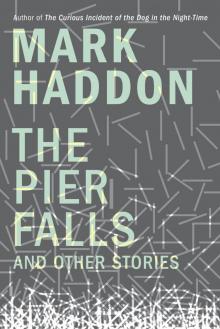 The Pier Falls: And Other Stories
The Pier Falls: And Other Stories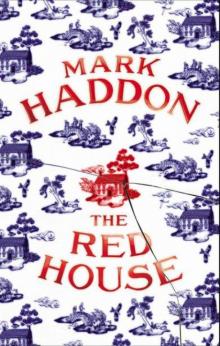 The Red House
The Red House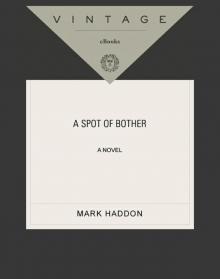 A Spot of Bother
A Spot of Bother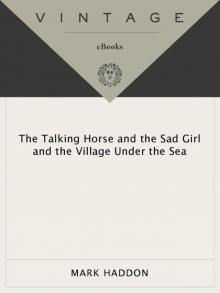 The Talking Horse and the Sad Girl and the Village Under the Sea: Poems
The Talking Horse and the Sad Girl and the Village Under the Sea: Poems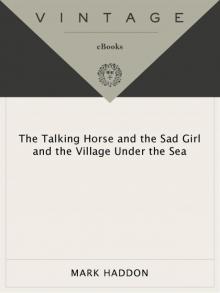 The Talking Horse and the Sad Girl and the Village Under the Sea
The Talking Horse and the Sad Girl and the Village Under the Sea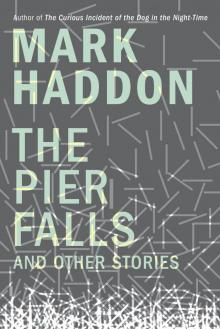 The Pier Falls
The Pier Falls